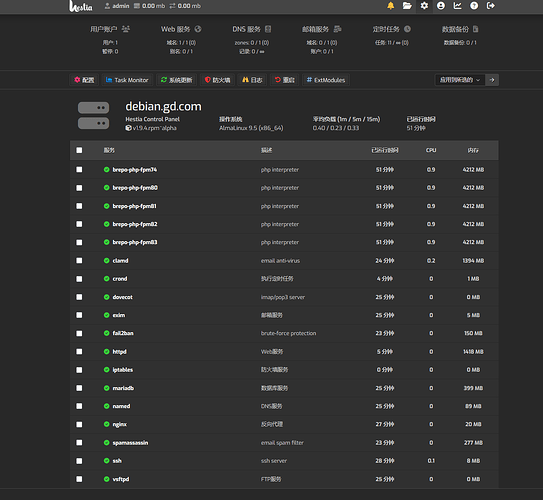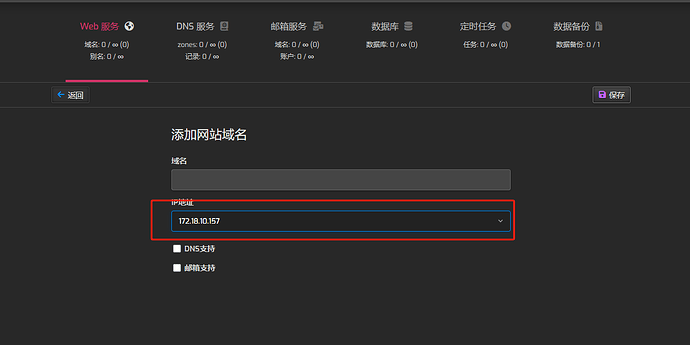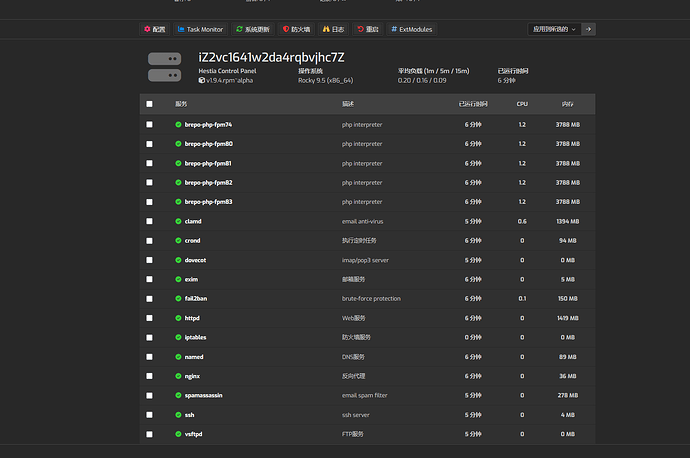I noticed that there’s a new RHEL branch in HestiaCP’s Git. I’m curious about when the official support for RHEL by HestiaCP will be released. Will it come with the 1.8 version or will it gradually be supported in the upcoming 1.7.9, 1.7.10 versions? HestiaCP is an excellent control panel, I wish it continues to prosper.
It is far from ready… And working
It was added to to the repo as the person working on it wasn’t motivated and had not time any more.
Is it something from the hcp-rhel branch? RHEL is mainly used by those who need a stable OS that does not change its behavior from release to release. This is why the STANDARD rpm packages from appstream should have been used instead of building custom ones. There is also remi-repo, a time-tested and user-proven repository with various versions of php, owned by the package maintainer for RHEL and Fedora. It is not quite clear why the branch developer for rhel went by building their own packages - first, it may deprive the distribution of the stability, which users expect, and secondly, it requires additional costs for the maintenance of software packages that are already in the repositories of the OS.
Hestia requires it own custom packages.
And there are a lot of changes from Debian VS RHEL so not everything is working.
Yeah, I saw that. At first glance I thought it was terrible, but digging deeper I realized it wasn’t all bad. however, many things still didn’t seem to be as I expected and I fixed the installer a bit. Haven’t had a chance to test it yet, unfortunatelly. My version of support of RHEL-based distros · raven-kg/hestiacp@6b8672d · GitHub
The person working on it did make a lot of changes
If wanted I can create a beta repo containing the hestia-php and hestia-nginx packages when done feel free to create a pr
Yeah, that would be great
As I understand that support for the RPM OS by HestiaCP has been discontinued. I see that the branch for rhel has been archived, and the installation script seems does not work correctly with the latest RPM-based OS, as the RPM templates have been removed from the main branch.
However, I still find the control panel to be powerful and I really like it, and I also like the RPM-based OS. I have attempted to adapt it to the RPM (Alma Linux 9, Rocky Linux 9, CentOS 9 Stream, etc.), making a lot of changes to the installation script and utilities (config file locations, service names, PHP locations, SSHD options for authorization, etc.).
I have also attempted to gather changes from the raven_kg fork and my changes in project - GitHub - bayrepo/hestiacp-rpm: Hestia Control Panel (RPM Edition) | A lightweight and powerful control panel for the modern web. - and it seems to work on Alma Linux 9, Rocky Linux 9, CentOS 9 Stream and other RPM-based systems. I plan to continue supporting RPM installation of Hestiacp and making further changes. Currently, I am working on correct installation of the web application for domains (currently adapted Laravel, Grav, Flarum, and OpenCart, etc.).
I wrote an article about adaptation of the panel for RPM: Как я выбирал и дорабатывал контрольную панель для управления сервером | BayRepo. ХобТех - электроника, программирование, эксперименты, исследования - путь чайника, блог удач и неудач
I am happy to include it in the next release if you get it fully up to date.
Our lack of knowledge with RPM was the biggest issue to keep it working properly and removing would prevent use to keep it fully up to date when it not tested by us…
I am happy to host the packages if you want ![]()
Hello, Eris. The RPM version of HestiaCP for Ubuntu/Debian is a bit outdated, as I began working on it from the GitHub repository of raven-kg: GitHub - raven-kg/hestiacp: Hestia Control Panel | A lightweight and powerful control panel for the modern web.. In this repository, were correctly added the PHPs from the remi repository and many service files for the proper functioning of the panel.
This was my starting point, and currently I made this version of HestiaCP correctly work.
The Debian/Ubuntu version of HestiaCP has 1028 new commits, and I will try to include these commits step by step. However, the current outdated version of HestiaCP can still be used with RPM based OS, and the community can write me if I have missed anything in the adaptation process.
You can find the repository here: Список достпуных в репозитории пакетов. The source RPM packages from which HestiaCP and its requires packages were built are also available here. I will maintain this repository.
I’m really glad to see someone contributing to the RHEL distribution for Hestiacp. Thank you so much!
After installation, it is not possible to access or deploy the website using a public IP address because the IP address displayed is an internal network IP address
I also found that the installation can continue after installation, need to adjust the strategy,
The domain name was not successfully changed in Rocky 9.5,
Hello, @yunli. About the public IP, I have added a new parameter nopublicip:
# bash hst-install-rhel.sh --help | grep nopublicip
-I, --nopublicip Use local ip [yes|no] default: yes
it is enabled in the install script by default, it use current IP of the server. For restoring HestiaCP default behaviour of IP detecting need to use --nopublicip=no, if this behaviour is confusing I will change it to no, by default in the installation script.
Not fully understand about continue installation after installation, what commands set I need to execute for reproducing.
About domain name I will check.
I am creating a brand new page for your Russian language page. I will push it to your warehouse later!
I have already sent the relevant content to your Gmail
Adjust the following code in the # Checking root permissions section of the installation program
if [ -d "/usr/local/hestia" ] && [ "$force" = "no" ]; then
check_result 1 "Hestia install detected. Unable to continue"
fi
if [ -d "/usr/local/hestia" ] || rpm -q hestia &>/dev/null; then
check_result 1 "Hestia install detected. Unable to continue"
exit 1
fi
It can successfully prevent users from repeatedly running and installing Hestia programs
Strangely, I made modifications
-I, --nopublicip Use local ip [yes|no] default: no
Restarting the server webpage afterwards surprisingly has no effect! Only display loading unsuccessful
Still an internal IP address
The installation program displays the following error! It’s obvious that the format is incorrect
WARNING: Wed Apr 23 06:33:04 2025 -> remote_cvdhead: file not found: https://clamav-mirror.ru//daily.cld /
WARNING: Wed Apr 23 06:33:30 2025 -> remote_cvdhead: file not found: https://clamav-mirror.ru//main.cld \
WARNING: Wed Apr 23 06:33:53 2025 -> remote_cvdhead: file not found: https://clamav-mirror.ru//bytecode.cld
Hello, @yunli! I am adding some fixes to the install script by your feedback. Back soon with comments and fixes.
This is the relevant command executed when there is no response when accessing the IP address after restarting the system! I’m not very familiar with rhel. Just to test rpm!
I guess it has something to do with firewalls! It seems that it makes sense for Hestia to use her own firewall!
[root@iZ2vc1641w2da4rqbvjhc7Z ~]# firewall-cmd --list-ports
[root@iZ2vc1641w2da4rqbvjhc7Z ~]# firewall-cmd --permanent --add-port=8083/tcp
success
[root@iZ2vc1641w2da4rqbvjhc7Z ~]# firewall-cmd --reload
success
[root@iZ2vc1641w2da4rqbvjhc7Z ~]# semanage port -l | grep http_port_t
http_port_t tcp 80, 81, 443, 488, 8008, 8009, 8443, 9000
pegasus_http_port_t tcp 5988
[root@iZ2vc1641w2da4rqbvjhc7Z ~]# semanage port -a -t http_port_t -p tcp 8083
Port tcp/8083 already defined, modifying instead
[root@iZ2vc1641w2da4rqbvjhc7Z ~]# semanage port -l | grep http_port_t
http_port_t tcp 8083, 80, 81, 443, 488, 8008, 8009, 8443, 9000
pegasus_http_port_t tcp 5988
[root@iZ2vc1641w2da4rqbvjhc7Z ~]# sudo systemctl restart httpd
[root@iZ2vc1641w2da4rqbvjhc7Z ~]# curl -I http://56.13.77.195
^C
[root@iZ2vc1641w2da4rqbvjhc7Z ~]# curl -I http://localhost
curl: (7) Failed to connect to localhost port 80: connection denied
[root@iZ2vc1641w2da4rqbvjhc7Z ~]# ss -tulnp | grep ':80'
tcp LISTEN 0 511 0.0.0.0:8083 0.0.0.0:* users:(("hestia-nginx",pid=724,fd=6),("hestia-nginx",pid=723,fd=6))
tcp LISTEN 0 511 172.18.10.157:80 0.0.0.0:* users:(("nginx",pid=1519,fd=9),("nginx",pid=1518,fd=9),("nginx",pid=1511,fd=9))
tcp LISTEN 0 511 172.18.10.157:8080 0.0.0.0:* users:(("httpd",pid=202881,fd=4),("httpd",pid=202880,fd=4),("httpd",pid=202879,fd=4),("httpd",pid=202874,fd=4))
tcp LISTEN 0 511 127.0.0.1:8084 0.0.0.0:* users:(("nginx",pid=1519,fd=11),("nginx",pid=1518,fd=11),("nginx",pid=1511,fd=11))
tcp LISTEN 0 511 127.0.0.1:8081 0.0.0.0:* users:(("httpd",pid=202881,fd=5),("httpd",pid=202880,fd=5),("httpd",pid=202879,fd=5),("httpd",pid=202874,fd=5))
hestiadocs.brepo.ru Inaccessible!




